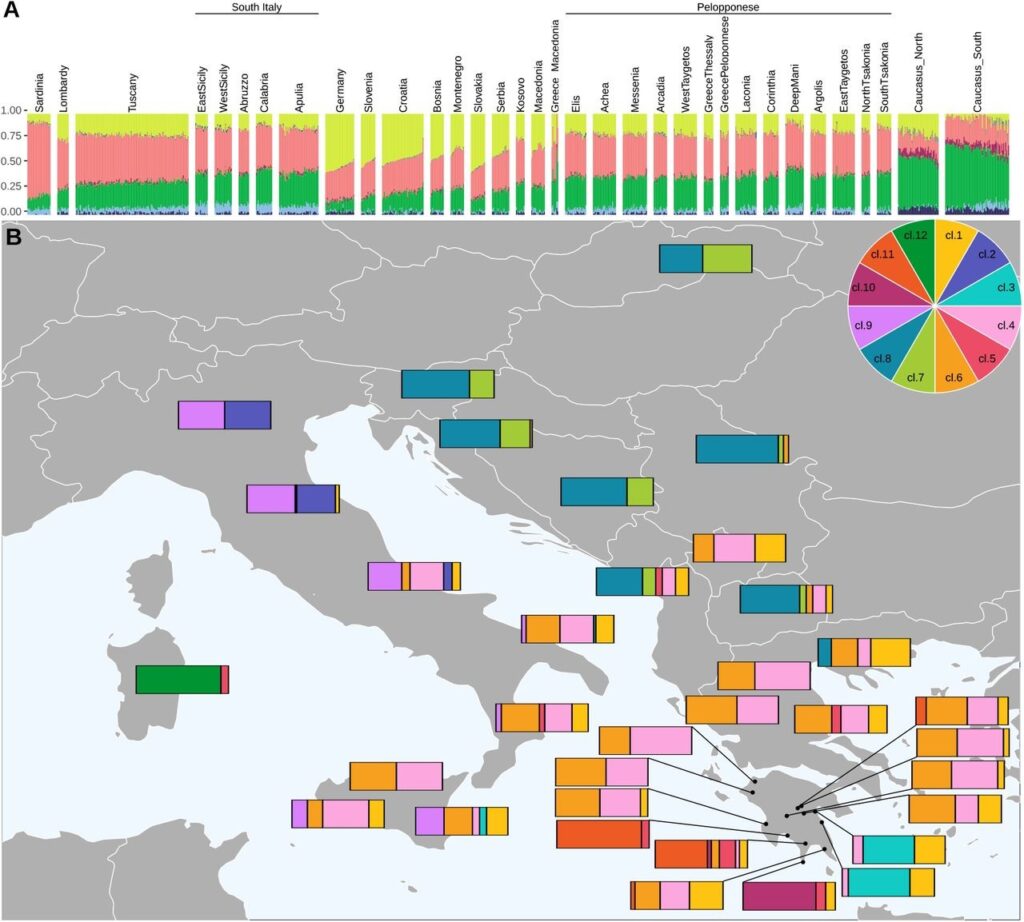A brand new DNA study found that the modern populations of southern Italy, Sicily, Greece and Cyprus have very close genetic similarities, an unsurprising fact considering that they are all descended from the Ancient Greeks.
In a study published by Biorxiv and titled: "Assessing temporal and geographic contacts across the Adriatic Sea through the analysis of genome-wide data from Southern Italy," the researchers found that there was "a high similarity between Southern Italy and the Peloponnese."
"In fact, our cluster analysis showed that present-day South-Eastern Peloponnesian populations have high genetic affinity with modern Apulians, Calabrians and South-Eastern Sicilians, all characterised by a cluster composition different from those displayed by other Greek groups," the researchers reported.

"Additionally, individuals from Western Sicily show similarities with populations inhabiting the Western part of Peloponnese.
"Although establishing the chronological context for this affinity using present-day genomes might be challenging, our results are in accordance with archaeological and historical sources that attributed the origin of Greek colonies in South-Eastern Sicily and Apulia from populations inhabiting the southern and Eastern parts of the Peloponnese.
"Uniparental Y-chromosome findings are also in agreement with these observations revealing Eastern Peloponnesian ancestries in East Sicily (34) and shared haplogroups among modern-day Greeks and populations living in Southern Italian areas colonised by Greeks such as the Salento (Apulia) and the Ionian coast of Calabria."
Greeks settled in southern Italy and founded Magna Graecia

Magna Graecia includes the southern part of Italy. There, the Greeks expanded and founded cities famous for their wealth and culture, such as Reggio, Naples and Syracuse, among others. The region became an important centre of Greek civilization.
One of its cities, Croton, reputed to have the finest physicians in the Greek world, was the home of the 6th-century athlete Milo, who was six times victor in wrestling at both the Olympic and Pythian games.
Magna Graecia was the seat of the Pythagorean and Eleatic systems of philosophy.
Euboeans founded the first colonies, Pithecussae and Cumae, about 750 BC, and subsequently Spartans settled at Tarentum; Achaeans at Metapontum, Sybaris, and Croton; Locrians at Locri Epizephyrii; and Chalcidians at Rhegium (Reggio di Calabria).
Greek colonists, following in the footsteps of the Bronze Age Mycenaeans, selected Magna Graecia as a suitable site for colonies due to the fertility of the land and, at the meeting point of the Greek, Etruscan, and Phoenician worlds, its advantageous geographical position for trade.

That the colonies in southern Italy became a fully integrated part of the Greek world is evidenced in the presence of votive offerings from Magna Graecia at the great religious sanctuaries of Delphi and Olympia.
Indeed, the ceasefire (ekecheiria) which was enforced during the Olympic Games was also respected in the colonies, and the list of victors at Olympia includes many a name from Magna Graecia.
However, the region was not a single harmonious entity, for just as on mainland Greece, small city-states or poleis (quite independent from their founding mother-city) both competed and cooperated with neighbouring cities to form a constantly shifting political network of rivalries and alliances.
The region was also subject to greater political instability precisely because it was at the crossroads of several civilizations, and its wealth in natural resources meant that territory was often enviously regarded, particularly by the tyrants of Sicily.
These Greek cities were also unstable internally due to their cosmopolitan mix of races - locals, colonists, mercenaries, residents from neighbouring areas etc.
Read the full research here.
READ MORE: Greeks of South Italy Film Series Returns By Popular Demand.


